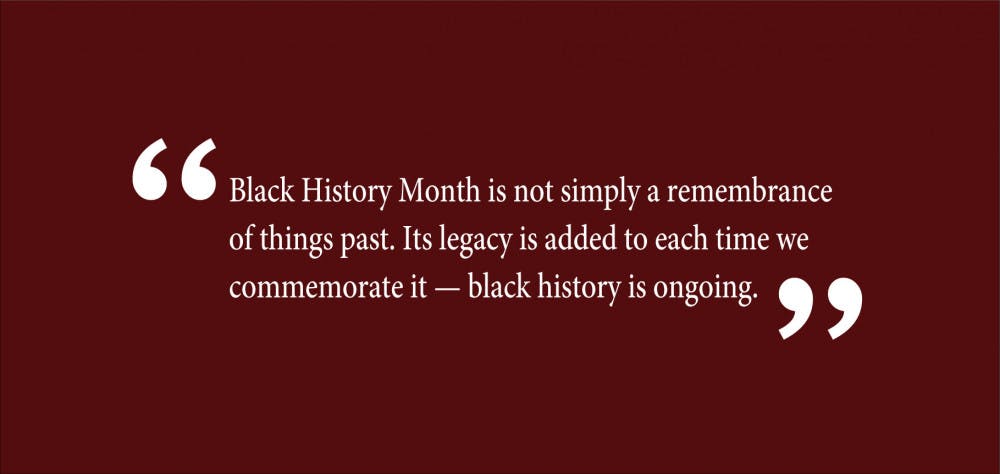It’s Black History Month. Every February is dedicated to appreciating the history of black people in the United States. Superficially, people recognize the significance of this month of remembrance; when presented with the statement “Black History Month is important” many would agree. But, not everyone would agree, and some might even ask “Is Black History Month even important?” While this question comes with a noticeable dose of skepticism, the question is still worth engaging. It would be easy to dismiss the question as a waste of time or to assume the person asking is racist. Instead of doing that, I suggest we view it as a legitimate inquiry, and respond accordingly — as my fellow columnist Aidan Calvelli ’19 has noted, such conversations can create an opportunity for learning. And this learning isn’t necessarily just for the person asking the question.
In articulating the importance of Black History Month, I also provide myself with a way to solidify my own understanding of this month’s significance. It’s safe to assume that most, if not all of us, are at least somewhat familiar with the staple figures and events of Black History Month. Martin Luther King Jr. gave his “I Have a Dream” speech. Rosa Parks refused to give up her seat on a bus. Nine brave students integrated their high school in Little Rock. On their own, people and moments like these are inspiring. The resiliency and courage on display here is remarkable.
It’s also important to remember the large-scale implications of these historic moments. When we think about Black History Month, we’re celebrating the history of black people in this country, yes. But the fact of the matter is that black history is history, in general. So while this month is meant to remember and uplift black people, these moments should not be separate from the larger national memory. These people and events had implications for the entire country and inform how we all experience the world today — black history is relevant to everyone.
Acknowledging the past that’s gotten us to where we are now is vital. But we should celebrate these moments with caution. At times, memorializing historical events implies a break between past and present; with Black History Month, this implied break can suggest a transition into an imagined post-racial society. Conversely, the spirit of racial progress captured within Black History Month similarly persists today; history is constantly being made, so black history is also being written all the time. Recent memory provides us with multiple examples. At the Rio Olympics, Simone Manuel became the first African-American woman to win a gold medal in an individual swimming event. At last year’s World Championships, gymnast Simone Biles won her 13th gold medal, more than any gymnast ever. And in the world of print, the Harvard Crimson elected its first black woman editor-in-chief last year. This is to say that Black History Month is not simply a remembrance of things past. Its legacy is added to each time we commemorate it — black history is ongoing.
As historical past instructs our future, the significance of Black History Month to black youth cannot be understated. I’ve written about the importance of representation before, and the argument still stands. Positive representation is powerful. To have a month that centers the contributions of black people to this country allows young black children to feel a rare sense of belonging; understanding that your possibilities are endless is an experience that everyone should have. Promoting black historical figures in highly visible ways combats existing stereotypes. For example, mainstream media — which often portrays black men negatively and neglects to represent black women at all — instead focuses on the accomplishments of black people in general. And films like Black Panther and Spider-Man: Into the Spider-Verse also provide young black children with positive representations of themselves. As celebrations of black identity — both in history and popular culture — increase, it drives a positive feedback loop of Black History Month. The month itself, then, serves as a way to inspire youth to make their mark — black history has an ever-growing legacy.
On a more personal note, this Black History Month I’m thinking about black students at Brown and the amazing work they’ve done this month to make it incredible. Thursday was Soul Food Night at the Ratty, and it was stellar. I enjoyed catfish, mac n cheese, and greens, which reminded me of making greens with my grandma during Thanksgiving when I was little. Classic R&B hits played on a speaker while I enjoyed my meal. I thought about all the times I’d heard those songs in the car with my mom. Everyone I talked to was in a good mood and was having a great time. I felt like I was at home with family. For me, at least, part of the importance of Black History Month can’t be precisely articulated. In that moment, I simply felt an indescribable joy.
So, that’s why Black History Month is important. While the month’s name might only refer to elements of the past, Black History has past, present and future components within it. It’s a celebration that’s significant for everyone, and for some black folks, the importance of it can’t even be put entirely into words. Through opting to respond to the initial questioning of Black History Month’s purpose, this explanation was possible, thus building a mutual understanding on the part of both skeptic and proponent.
Quentin Thomas ’21 can be reached at quentin_thomas@brown.edu. Please send responses to this opinion to letters@browndailyherald.com and op-eds to opinions@browndailyherald.com.





